Viewpoint: Chemical weapons ‘threat to West’
- Published
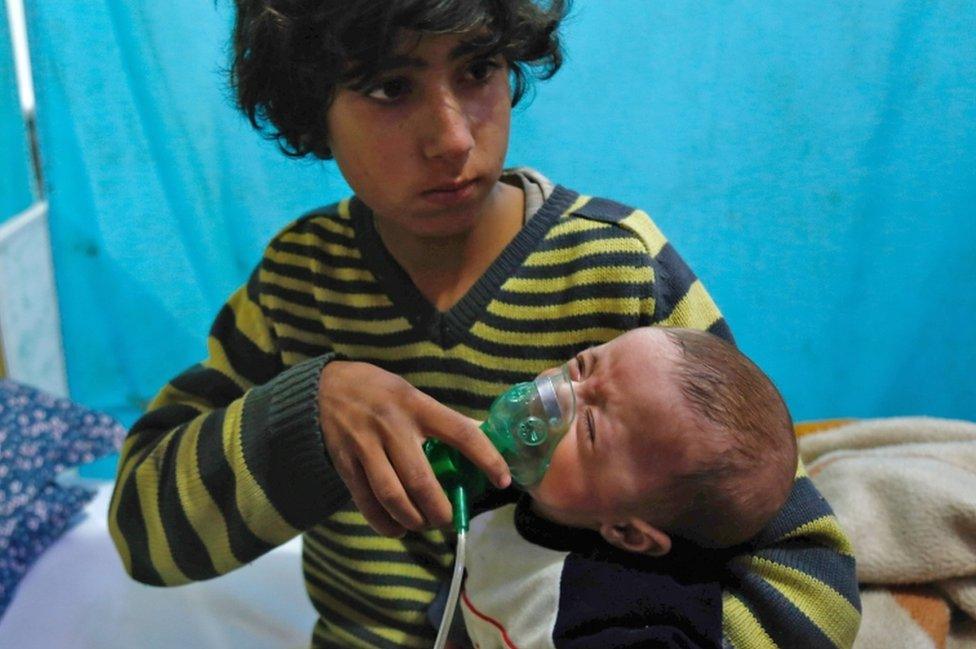
A Syrian boy holds an oxygen mask over a baby's face at a makeshift hospital, after a reported gas attack on the eastern Ghouta region
Reports of attacks using chemical weapons in Syria are occurring with alarming frequency, despite international warnings that such acts cross an intolerable red line.
Here, chemical weapons expert Hamish de Bretton-Gordon argues that the world is becoming too passive on this issue, and could end up paying the price.

There have been at least six documented chemical attacks in the Ghouta region and Idlib province, allegedly by the Syrian government, in the last two weeks.
These have predominantly been chlorine, dropped, witnesses say, as barrel bombs or fired in rockets - though the most recent attack on the town of Saraqeb on 4 February appears to be the deadly nerve agent, Sarin. Three children are reported to have been killed.
As we approach the seventh year of the shockingly violent conflict, this war has become synonymous with two distinct and irrefutable crimes against humanity: the use of chemical weapons, and - aid agencies say - the direct targeting of hospitals and medical personnel.
While the Syrian government has consistently denied using chemical weapons or targeting medical facilities, evidence I have seen contradicts this.
In this seven-year period there have been over a thousand documented uses of chemical weapons, and the UN's inspectors, the Organisation for the Prohibition of Chemical Weapons (OPCW), have been called to investigate some attacks.
However Russia, Syria's key ally, has vetoed their activities 10 times to date.
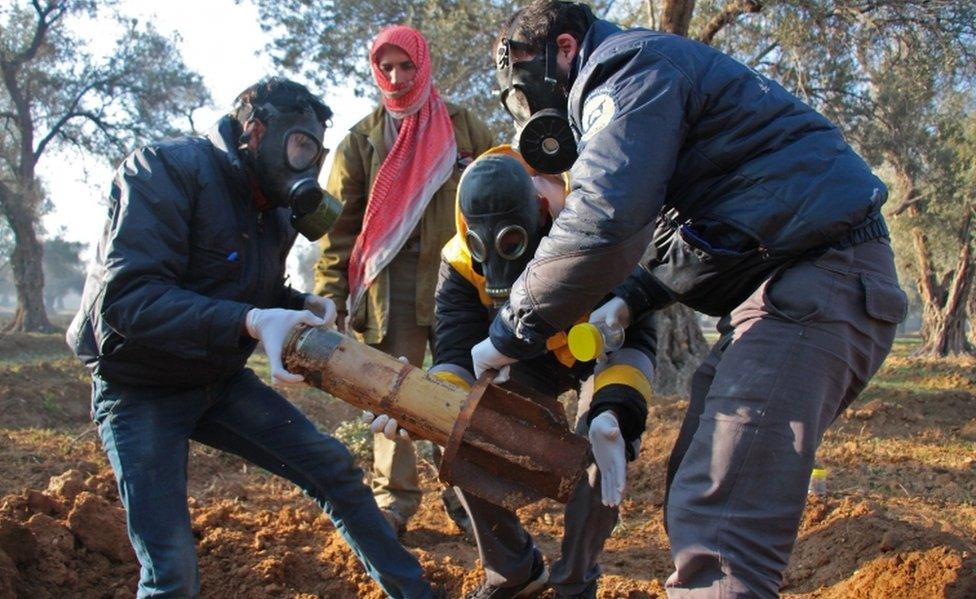
Members of the Syria Civil Defence remove parts of a rocket reportedly fired by government forces on the outskirts of Douma, in the eastern Ghouta region
I have also investigated a number of attacks, and on 29 April 2014 published the results of our investigation into the attacks on Kafr Zita and Talemenes, external.
This unequivocally showed that chlorine was used, and it is my conclusion that the Syrian government was responsible. With the same information the OPCW concurred six months later that chlorine had been used.
This cannot be the best we can do, given the instant real-time news available across social media?
The OPCW is a Nobel Peace prize winner, and a well-deserved one, but its modus operandi, though well-suited for a Cold War-type scenario, is out of kilter with the fast-moving conflicts and terror attacks we now see.
An urgent review is required of its operating procedures, in order that it can produce timely results which the UN can act on to prevent further atrocities and proliferation.
Notwithstanding the fact that Russia is likely to veto any change, the other four permanent members of the UN Security Council (the US, UK, France and China) must act together to ensure this review happens.
President Macron stated on 13 February 2018 that France would strike Syria if there is proof of chemical usage, which his own security service appears thus far to have missed.
But given an abundance of evidence already in existence, he must surely take that decision soon.
At least one Western security service is sure Syrian President Bashar al-Assad is still using Sarin (the OPCW concluded he had dropped Sarin on Khan Sheikhoun in April 2017, external), and investigation of the latest reported attack on 4 February points to Sarin, as do a number of investigations in the Eastern Ghouta region over the last two months.
However, there is a worrying suggestion that some now do not see chlorine and other toxic materials as chemical weapons - perhaps the reason for French and other inactivity in the face of clear and multiple uses of chlorine?
The Geneva Convention and the Chemical Weapons Convention (CWC) are clear that it is illegal to use any toxic substance to kill or injure people.
This promise of action by world leaders, which has not hitherto been followed through - except by President Trump's strike on 6 April 2017 after the Khan Sheikhoun nerve agent attack - has ultimately lead to the 100-year taboo on the use of chemical weapons being broken, and the possibility of every despot, dictator, rogue state or terrorist using them with impunity in future.
Abo Rabeea says he is still suffering from the chemical weapons strike in Khan Sheikhoun (May 2017)
Most Nato countries, including the UK, have paid lip service to the chemical threat since the end of the Cold War, because they believed it had disappeared, and in military parlance, have taken a "capability holiday" with chemical weapon defence.
Though Russia continues to deny the use of chemical weapons in Syria in the face of overwhelming evidence, and has actively prevented the UN investigating such allegations, I do not believe it is directly involved in their use in Syria - though it must be aware of it.
The Syrian jets which experts say dropped the nerve agent on Khan Sheikhoun took off from Shayrat airbase, where Russia has personnel.
Even the most casual observer would have noticed "be-suited" and gas-masked soldiers loading these bombs.
In the new "Cold War" with Russia, Nato must be prepared for chemical weapon usage.
Though Russia and the US have destroyed their chemical stocks, they still maintain the capability to produce new ones, and there is speculation that research has been done on new super chemicals many times more potent than nerve agents like Sarin and VX.
All have seen how effective chemical weapons have been in Syria and Iraq, especially in fighting in built-up areas, and if there is conflict between East and West we must now assume that chemical weapons will be used.
This sadly being the case, quite apart from the very real threat of terrorist use, anywhere any time, Nato needs to re-invest in its chemical defence capabilities and be prepared to fight in this "dirty" environment - or we could quickly be rolled over by a concerted attack from the East.
Hamish de Bretton-Gordon is a chemical weapons expert and advisor to NGOs in Syria.
- Published5 February 2018
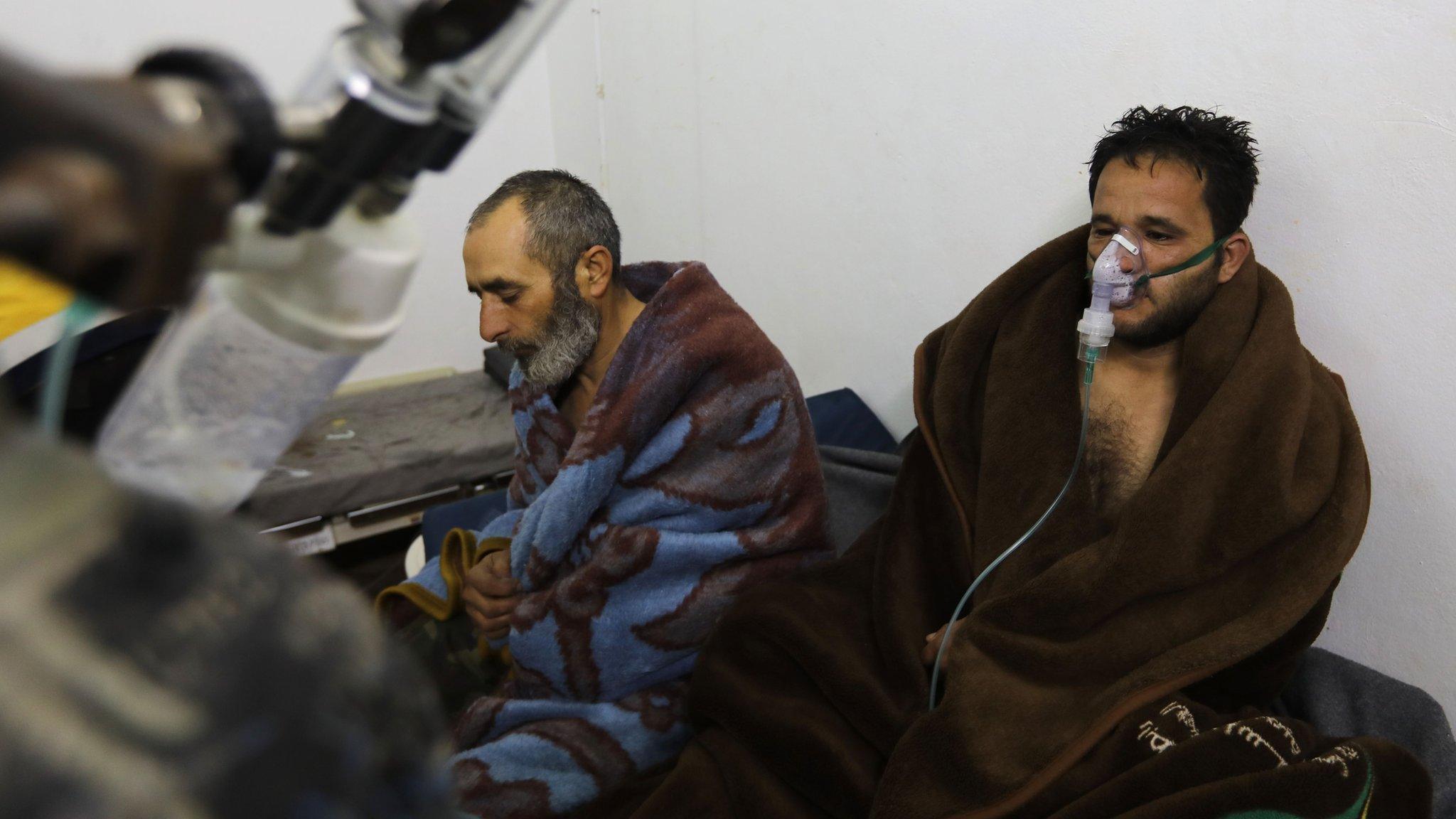
- Published27 October 2017
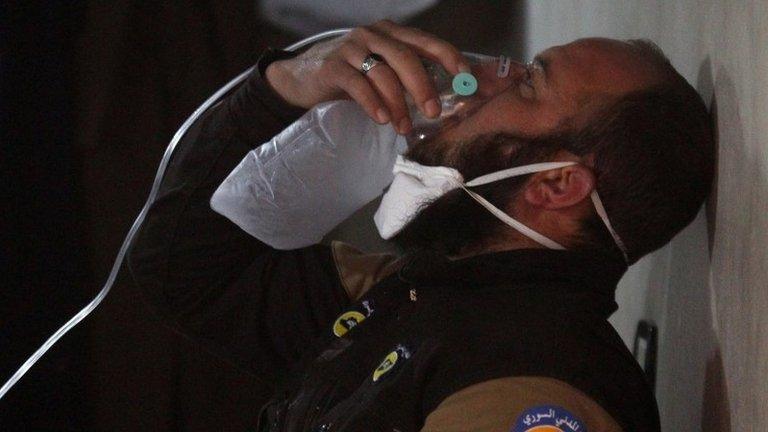
- Published4 May 2017
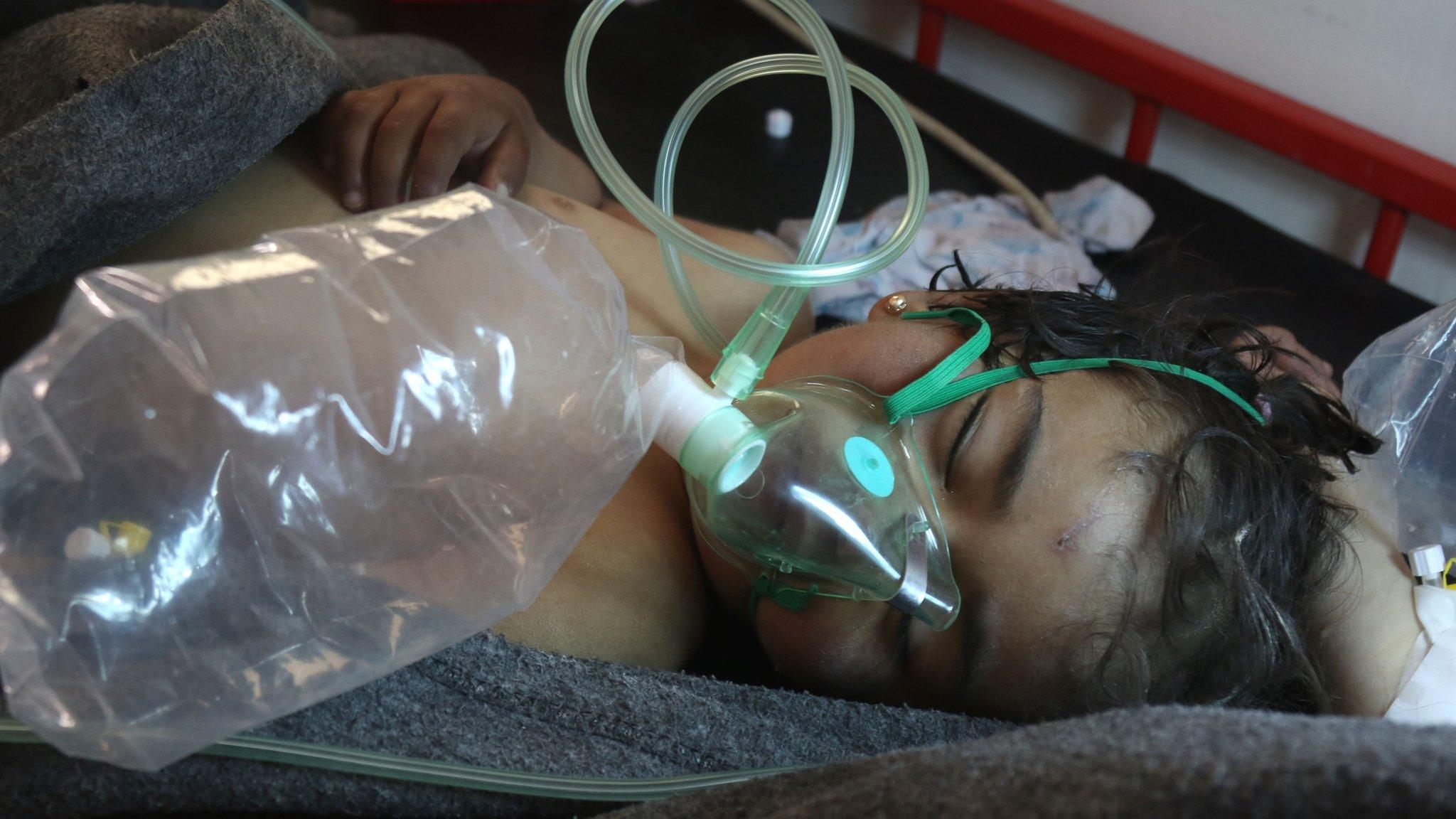
- Published26 April 2017
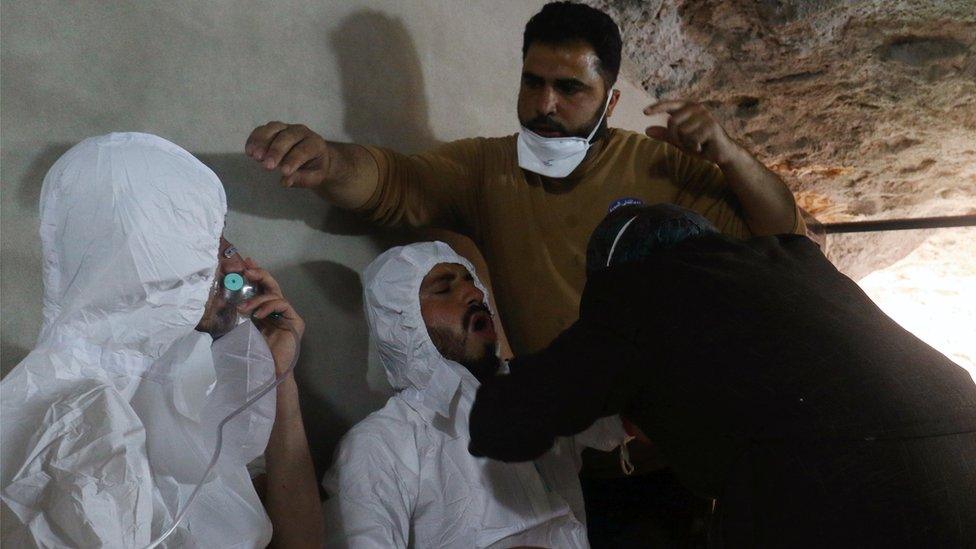
- Published4 April 2017
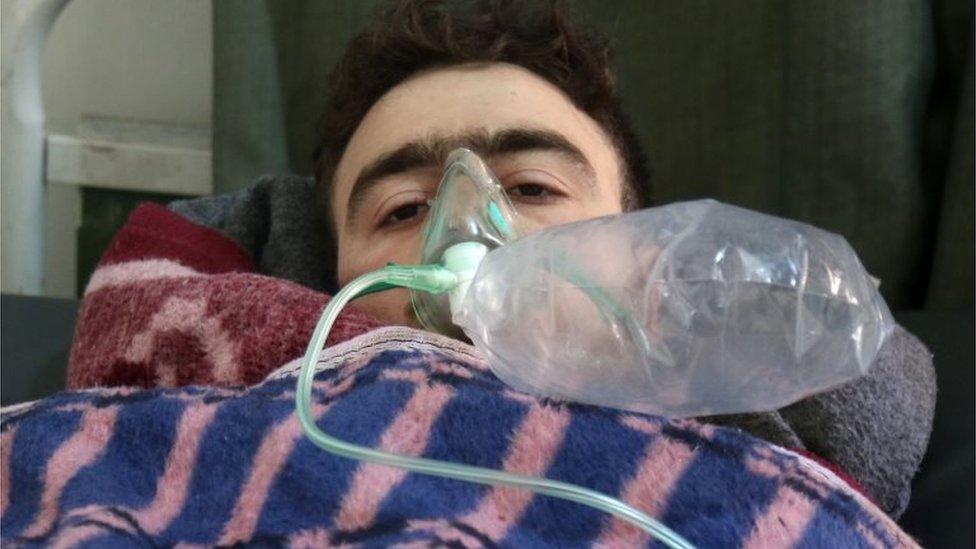
- Published2 May 2023
